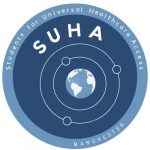Bridging the gap between refugees and healthcare services in Manchester during our time on the Global Health iBSc
This blog has been written by Danielle Hartland and Louis Clarke with regards to their year spent studying the Intercalated BSc in Global Health and experience working with the refugee and asylum seeker community in Manchester.
After completing our third year as medical students in September 2018, we enrolled onto the iBSc in Global Health at HCRI. On the course, we were taught contemporary issues relating to the barriers of accessing healthcare, including socioeconomic and cultural factors. We also learnt about the different ways to tackle health inequalities such as increasing community engagement and developing culturally appropriate healthcare initiatives. The course material, combined with our insight into the mechanics of the NHS, motivated us to look into ways we could benefit our local community.
We came across academic sources which suggested hostile government policies, NHS bureaucracy, and against migrant groups leave the population vulnerable to poor health – unclear about how to access heath support in their host country (Kang, Tomkow, & Farrington, 2019) (Bosworth, 2016) (Essess, Hamilton, & Gaucher, 2017). From this perspective, we established Students for Universal Healthcare Access (SUHA), which aims to help refugees and asylum seekers navigate the healthcare services they are entitled to.
Setting up our network
In the first few months, we developed a plan to run drop-in sessions for refugees and asylum seekers to talk directly to us about issues they were experiencing with the NHS. We ran our pilot scheme at Cornerstone Day Centre, as we’re fortunate to have connections there.
Running the drop-in sessions was a baptism of fire, as we had little idea what kinds of issues we would face, or how to deal with many of the situations we would come across. Nevertheless, we ran eleven drop in sessions and helped approximately 50 individuals who had general queries about rights to healthcare and understanding letters and appointment systems etc. The issues may seem straightforward to UK citizens, however, in reality they are more complex when considering the socio-political context of refugee and asylum seekers.
Unmet medical needs
The drop-in sessions highlighted a stark demand for basic dental and health check-ups, as one third of individuals had questions about seeing a dentist and one in five required help registering or seeing a GP. We also encountered several common barriers to accessing healthcare such as lengthy forms, complicated processes to claim back healthcare costs; and general frustration toward bureaucracy.
Lack of awareness of refugee rights among healthcare staff, as well as language and inadequate interpreter services were also common barriers. Many individuals we spoke to during the drop in sessions required translators however, in our case we were fortunate to access translation services through the centre. Moreover, the prevalence of mental health issues and insomnia among the individuals became clear and we realised that we needed to quickly expand our knowledge of health care services. With this in mind, we created a resource handbook to signpost individuals to access more specialised support. Through the drop in sessions, the most popular services provided by SUHA was booking medical appointments on behalf of individuals and providing reassurance that a refugee/asylum seeker status entitled them (in most cases) to the same level of free healthcare as a UK citizen.
Insight from our degree
The issues uncovered by the drop-in sessions contextualised theory learnt from iBSC, by providing real-world insight into the health impacts which often result from conflict and displacement. Going forward, we intend to utilise our practical and theoretical knowledge to implement initiatives this year, which combat the common health care problems highlighted in the drop-in sessions.
We also aim to expand SUHA by regularly running sessions at up to three more centres across Manchester and provide training and information evenings for centre volunteers and staff, as they have the most contact with Manchester’s migrant community. Through training, we aim to increase awareness of the rights refugees and asylum seekers are entitled to and improve signposting of healthcare services.
Overall, our experience with SUHA has been a challenging yet rewarding learning experience. We advise iBSc students to use the year productively and become familiar with the global health issues existing within the local Manchester community.
References
Bosworth, M. (2016). The Impact of Immigration Detention on Mental Health: A Literature Review. Criminal Justice, Borders and Citizenship Research Paper.
Essess, V. M., Hamilton, L. K., & Gaucher, D. (2017). The Global Refugee Crisis: Empirical Evidence and Policy Implications for Improving Public Attitudes and Facilitating Refugee Resettlement. Social Issues and Policy Review, 78-123.
Kang, C., Tomkow, L., & Farrington, R. (2019). Access to primary health care for asylum seekers and refugees: a qualitative study of service user experiences in the UK. British Journal of General Practice, 685.



0 Comments